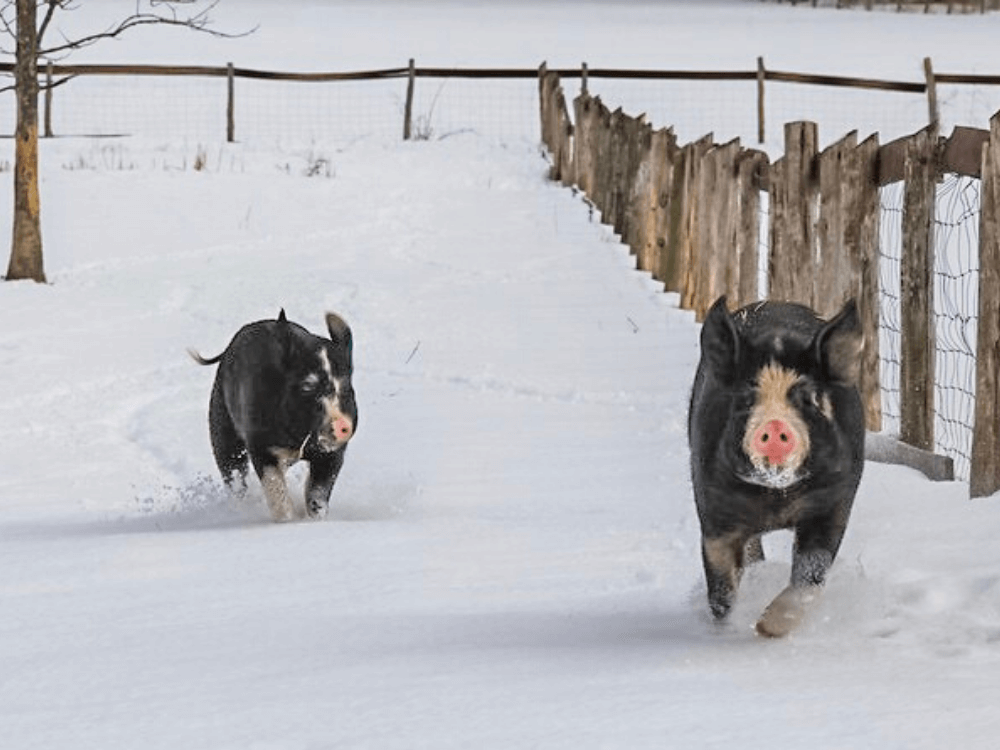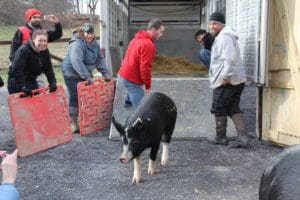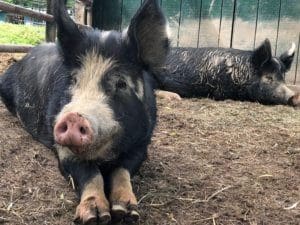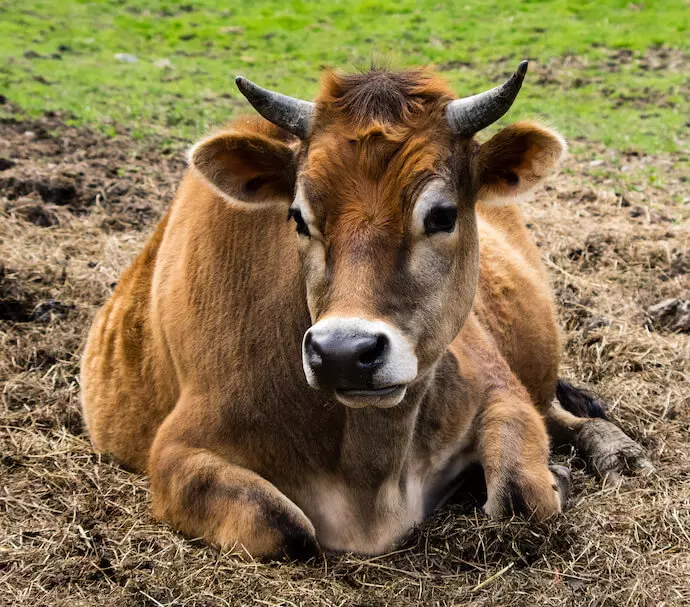
Five Years Of Love, Hope + Changing Hearts
“After 10 years of looking into thousands of pig eyes, I’ve come to understand that they’re never vacant. There’s always someone looking back at me” – Bob ComisIn the five years that Mario and Audrey have been here, we’ve come to know them as unique and sensational individuals. We’ve seen them take elaborate mud baths, come running full-tilt across the field when their names were called, sleep and dream side-by-side, legs twitching. We’ve seen them flop over for innumerable belly rubs, and even learn how to open some of our latched gates! We’ve fed them watermelon at Shindig in the summer, and pumpkins at Gobble & Groove in the fall. But most importantly, they have made an incredible impact on visitors to Catskill Animal Sanctuary. They have changed the hearts and minds of hundreds who had not perceived pigs to be sentient beings before meeting one, pressing their curious fingers against wet snouts, and watching as they lean into scratching hands just like dogs or cats do at home.
 When Mario and Audrey first came to Catskill Animal Sanctuary, they were young and full of life, and just about as lucky as two pigs could be. Unlike most pigs who are raised for their flesh, they’ve known little else but kindness for their entire lives.
They grew up on a “humane” pig farm, which means that unlike most pigs who are raised for their flesh, they lived a pretty good life, even if that life would have been cut short at a fraction of their lifespan. Bob Comis, the farmer who raised them, believed “Happy pigs make happy meat,” but even Bob Comis, the person both responsible for raising them to be slaughtered and sending them to sanctuary, the very person who wanted so badly to believe in the “Humane Myth,” knows the “happy meat” idea to be hollow—a marketing ploy, an outright lie. In a Huffington Post column, Comis wrote, “In the current discourse, happy pigs are the ideal alternative to the miserable and abused pigs raised in factory farms… Should we, really, feel good about such a thing, if it even exists? Is it so simple? I am haunted by the ghosts of nearly 2,000 happy pigs.”
Unlike their brothers, or cousins, or mothers who were raised inside of a shed, never feeling the warmth of the sun’s rays, or feeling grass beneath their feet, Mario and Audrey got to play in the woods, but that didn’t mean they would never come to know terror. They could dig in the dirt with their powerful noses, it’s true, and they could express their personalities, their likes and dislikes, as every animal should… But the sad reality of all animals raised to be food—even the happiest ones, like Mario and Audrey—is that once they reached their slaughter weight (about 250 pounds) after less than two years of life, they would have been shipped off to be killed one by one after a stressful waiting period in a strange, grisly holding pen with new smells of fear and blood and excrement.
The trauma of seeing his happy pigs meet such gruesome deaths convinced Bob Comis to stop farming pigs altogether. He transitioned to veganism and worked with documentary filmmaker, Allison Argo, to capture his transition away from farming and exporting animals in the unforgettable film, The Last Pig (2017).
In the end, Bob Comis saved six of his last pigs and sent them to sanctuary, including Mario and Audrey. Mario (formerly named “Ami,” meaning friend) was saved because he was the kindest. Audrey (formerly Niblet) was picked because she was the smartest.
When Mario and Audrey first came to Catskill Animal Sanctuary, they were young and full of life, and just about as lucky as two pigs could be. Unlike most pigs who are raised for their flesh, they’ve known little else but kindness for their entire lives.
They grew up on a “humane” pig farm, which means that unlike most pigs who are raised for their flesh, they lived a pretty good life, even if that life would have been cut short at a fraction of their lifespan. Bob Comis, the farmer who raised them, believed “Happy pigs make happy meat,” but even Bob Comis, the person both responsible for raising them to be slaughtered and sending them to sanctuary, the very person who wanted so badly to believe in the “Humane Myth,” knows the “happy meat” idea to be hollow—a marketing ploy, an outright lie. In a Huffington Post column, Comis wrote, “In the current discourse, happy pigs are the ideal alternative to the miserable and abused pigs raised in factory farms… Should we, really, feel good about such a thing, if it even exists? Is it so simple? I am haunted by the ghosts of nearly 2,000 happy pigs.”
Unlike their brothers, or cousins, or mothers who were raised inside of a shed, never feeling the warmth of the sun’s rays, or feeling grass beneath their feet, Mario and Audrey got to play in the woods, but that didn’t mean they would never come to know terror. They could dig in the dirt with their powerful noses, it’s true, and they could express their personalities, their likes and dislikes, as every animal should… But the sad reality of all animals raised to be food—even the happiest ones, like Mario and Audrey—is that once they reached their slaughter weight (about 250 pounds) after less than two years of life, they would have been shipped off to be killed one by one after a stressful waiting period in a strange, grisly holding pen with new smells of fear and blood and excrement.
The trauma of seeing his happy pigs meet such gruesome deaths convinced Bob Comis to stop farming pigs altogether. He transitioned to veganism and worked with documentary filmmaker, Allison Argo, to capture his transition away from farming and exporting animals in the unforgettable film, The Last Pig (2017).
In the end, Bob Comis saved six of his last pigs and sent them to sanctuary, including Mario and Audrey. Mario (formerly named “Ami,” meaning friend) was saved because he was the kindest. Audrey (formerly Niblet) was picked because she was the smartest. We are so grateful to Bob Comis for making the connection, and for giving us the tremendous opportunity to care for and to love Mario and Audrey. They remind us every day to be curious, to explore, to eat delicious snacks, and to take long naps. But most importantly, they teach us to never, ever underestimate a pig.
It’s these pigs, after all, who break down the defensive walls of our visitors, who stretch their bodies with gusto for belly-rubs, who surprise us with their intelligence when they figure out who to open locked gates, and who convince even the staunchest omnivores that pigs are no different from the dogs we love at home.
Because Bob Comis saved Mario and Audrey—pig ambassadors—five years ago, the lives of countless pigs have been spared by those who have made the connection between the flesh on their plates and the beautiful, kind beings at Catskill Animal Sanctuary.
Love Spoken Here. Today and Every Day.
We are so grateful to Bob Comis for making the connection, and for giving us the tremendous opportunity to care for and to love Mario and Audrey. They remind us every day to be curious, to explore, to eat delicious snacks, and to take long naps. But most importantly, they teach us to never, ever underestimate a pig.
It’s these pigs, after all, who break down the defensive walls of our visitors, who stretch their bodies with gusto for belly-rubs, who surprise us with their intelligence when they figure out who to open locked gates, and who convince even the staunchest omnivores that pigs are no different from the dogs we love at home.
Because Bob Comis saved Mario and Audrey—pig ambassadors—five years ago, the lives of countless pigs have been spared by those who have made the connection between the flesh on their plates and the beautiful, kind beings at Catskill Animal Sanctuary.
Love Spoken Here. Today and Every Day.
animal rescue, audrey, bob comis, mario, pig, pigs, rescue, Sanctuary Journal, the last pig, vegan
Comments are closed.






Kathy,
In this season of Love and Joy, I appreciate how you offer us year-round opportunities to make the connection between All Animals (human and non-human animals). I met Mario and Audrey on my first visit to CAS. I met Allison in Orlando during a local screening of her film. And having spent so much time on your beautiful sanctuary, it warms my heart to see this story of honoring the values we humans hold so dear: Compassion, Love, Joy, and Respect for One Another.
Thanks to you and your CAS team, to Allison for her beautiful film, to Bob for his big heart, and to the glorious pigs living The Dream, Audrey and Mario, for being what nature intended: Joyful and Loved.
May 2020 be the year more humans make the honorable connection to our wonderful animal friends.
Dee, as always thank you for your kind words and loving support. I’m SO glad Mario & Audrey’s story has touched you. Allison Argo & Bob Comis are heroes in our eyes. We echo your wishes for 2020.
Hope you’re having a very merry holiday season!
Love,
The Entire CAS Team
Dearest CAS, Kathy, and all those who live and work there, THANK YOU for lighting the path forward! You have provided futures to those who had none, while opening innumerable eyes and hearts.
Thank you for all you do – and love, xxxAllison♥
Allison,
We’re honored to know you and Bob Comis. We know for a fact that your film has touched many hearts, and in turn, has saved many lives. We would LOVE to have you visit little Niblet sometime soon.
Warmly,
The Entire CAS Team